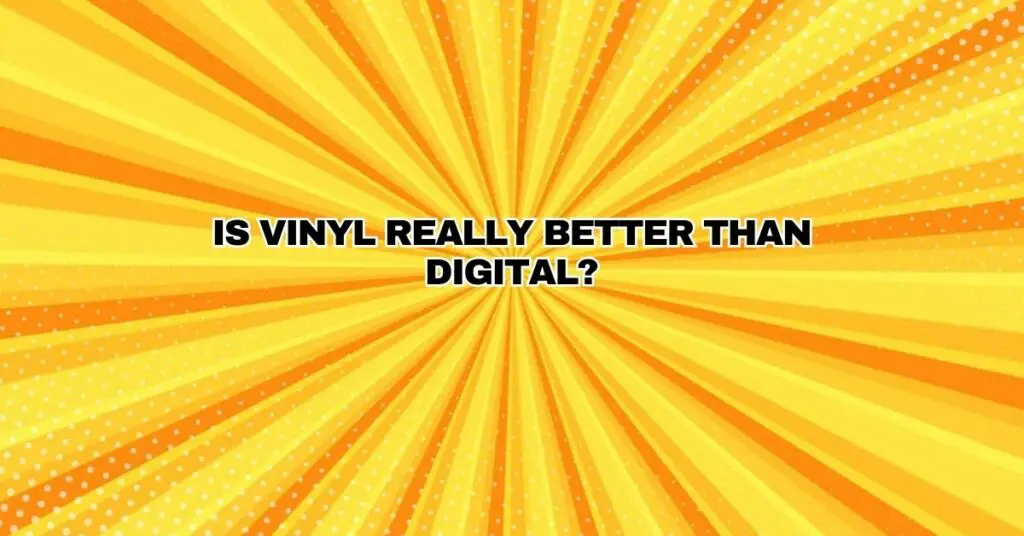The analog vs. digital audio debate has been raging for years, and one of the most prominent battlegrounds is the comparison between vinyl records and digital audio formats. Vinyl’s resurgence in popularity over the past few decades has sparked a passionate discussion among audiophiles and music enthusiasts. Many claim that vinyl offers a superior listening experience, while digital audio formats are lauded for their convenience and precision. In this article, we will explore the nuances of this debate and seek to answer the question: Is vinyl really better than digital?
The Vinyl Resurgence
Vinyl records, also known as LPs (Long Plays), enjoyed their heyday from the mid-20th century until the advent of CDs and digital audio. Vinyl’s decline seemed inevitable, as digital formats promised pristine sound quality, portability, and the ability to skip tracks with ease. However, in the early 2000s, vinyl records began making a comeback, and their popularity has continued to grow. This resurgence has been driven by a variety of factors:
- Nostalgia: Many music enthusiasts have fond memories of vinyl records and the tactile experience of handling and playing them. The vinyl revival allows them to reconnect with this nostalgia.
- Audiophile Appeal: Audiophiles, who seek the highest possible sound quality, have embraced vinyl for its analog warmth and richness.
- Tangible Collectibles: Vinyl records are often considered collector’s items. Limited editions, colored vinyl, and special packaging add to their appeal.
- Local Record Stores: Independent record stores have played a significant role in promoting vinyl, creating a community for enthusiasts.
- Unique Sound Characteristics: Vinyl records have a distinct sound profile that some listeners prefer, with their inherent imperfections, warm tonality, and dynamic range.
The Digital Advantage
Digital audio formats, on the other hand, offer numerous advantages that have made them the dominant medium for music consumption in recent decades:
- Convenience: Digital music is easily accessible, portable, and can be played on a wide range of devices, from smartphones to computers.
- Quality and Consistency: High-resolution digital formats, like FLAC and WAV, provide exceptional sound quality, with minimal degradation over time.
- Endless Selection: Digital music platforms offer an immense catalog of songs and albums at your fingertips.
- Precision and Reliability: Digital audio files are not susceptible to the wear and tear that vinyl records can experience, leading to consistent playback quality.
- Accessibility and Portability: You can carry your entire music library in your pocket, making it easy to enjoy music on the go.
The Audiophile Perspective
Audiophiles are often at the center of the vinyl vs. digital debate, as they are especially discerning about sound quality. Vinyl records have their appeal for audiophiles due to the following reasons:
- Analog Warmth: Vinyl records are known for their warm, analog sound, which some audiophiles prefer over the potentially sterile quality of digital audio.
- Dynamic Range: Vinyl records often offer a broader dynamic range, allowing for more expressive and lifelike sound reproduction.
- Artistic Experience: Audiophiles appreciate the tactile and artistic aspects of vinyl, including album artwork, gatefold sleeves, and the ritual of handling records.
- Collection Value: Vinyl records are seen as collectibles, and first pressings or rare editions can hold significant value for enthusiasts.
The Practical Reality
While the debate between vinyl and digital audio rages on, it’s essential to recognize that the decision ultimately comes down to personal preferences and practical considerations. Here are some key points to consider:
- Sound Quality: The sound quality of vinyl vs. digital audio depends on various factors, including the quality of the recording, mastering, playback equipment, and personal taste. Some may prefer the warmth of vinyl, while others prefer the precision of digital.
- Convenience: Digital audio is undeniably more convenient for everyday listening, especially on the go. Vinyl records require a turntable, careful handling, and can be less practical for modern, fast-paced lifestyles.
- Cost: Vinyl records, especially new and collectible editions, can be expensive. Digital music is often more cost-effective.
- Accessibility: Digital music provides immediate access to an extensive library of songs. Vinyl may require hunting for specific releases.
- Nostalgia and Aesthetics: Vinyl records offer a unique aesthetic and nostalgic value that digital audio cannot replicate.
The Verdict
The question of whether vinyl is really better than digital audio doesn’t have a one-size-fits-all answer. Both formats have their merits and limitations. Some people cherish the warm, tactile experience of vinyl, while others appreciate the convenience and precision of digital audio.
Ultimately, the “better” choice depends on your personal preferences, listening habits, and how you value the qualities of each format. For many, the debate itself is part of the charm, as it highlights the diversity of the music experience and the passionate discussions that surround it. Whether you’re spinning vinyl records on a turntable or streaming your favorite songs from a digital platform, the most crucial factor is your connection to the music itself.


